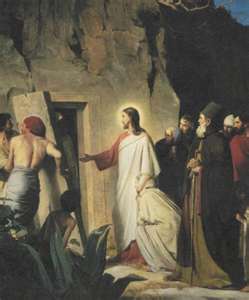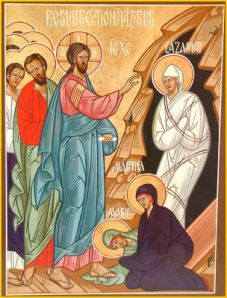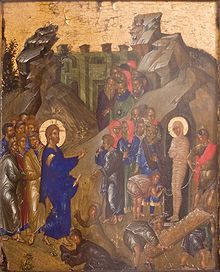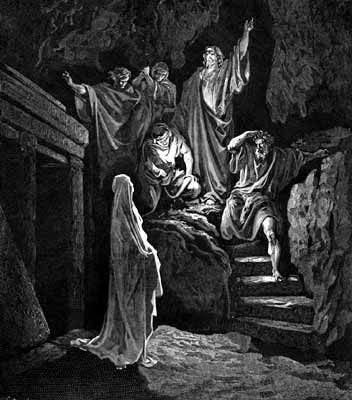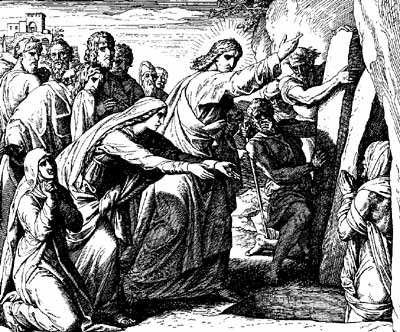"I'm Back!": The Raising of Lazarus, 5th Sunday of Lent

Unlike the other Gospels, John recounts only a limited number of miracles of Jesus, which he designates as “signs,” a rare term in the other Gospels. Although John tells us of only a few miracles, he describes them in much greater depth than the other gospel writers do. This is quite evident in this weekend’s Gospel reading, in which we get a very lengthy description of all the events surrounding the resurrection of Lazarus from the dead.
The Raising of Lazarus is the sixth of the seven “signs” of the Gospel of John: [1] The Water to Wine (John 2), [2] the Healing of the Official’s Son (John 4), [3] the Healing of the Paralytic at Bethesda (John 5), [4] the Feeding of the 5,000 (John 6), [5] The Healing of the Man Born Blind (John 9), [6] the Raising of Lazarus (John 11), and [7] the Death and Resurrection of Jesus (John 19-20). The signs seem to escalate as the Gospel progresses. The Healing of the Man Born Blind (last Sunday’s reading) was pretty impressive, but raising Lazarus is going to top it. The Gospel is building toward the seventh and final sign, the Resurrection of Christ.
The First Reading is an excellent choice: Ezekiel 37. This is the famous vision of the Dry Bones, after which an entire dead army of skeletons is resurrected before Ezekiel’s eyes. Afterward, God explains the meaning of the vision:
Reading 1 Ezekiel 37:12-14
Thus says the Lord GOD:
O my people, I will open your graves
and have you rise from them,
and bring you back to the land of Israel.
Then you shall know that I am the LORD,
when I open your graves and have you rise from them,
O my people!
I will put my spirit in you that you may live,
and I will settle you upon your land;
thus you shall know that I am the LORD.
I have promised, and I will do it, says the LORD.
I only wish the Lectionary included the entire story. However, it does preserve the most important verse:
“You shall know that I am the LORD, when I open your graves and have you rise from them, O my people!” Ezek 37:12
Thus, when Jesus opens Lazarus’ grave and causes him to rise, we know that Jesus is “the LORD,” that is, YHWH, the God of Israel. The sign of Lazarus’ resurrection points to the divinity of Christ.
Now, most study bibles will have notes in the margin or the bottom of the page informing the reader that this passage from Ezekiel 37 has nothing to do with resurrection from the dead, but only pertains to the restoration of the national hopes of Israel.
It is true that it pertains to the national hopes of Israel. However, the ancient manuscripts of Ezekiel were circulated without the notes in the RSVCE2 or NAB, etc., and the ancient readers tended to assume that, since the text explicitly describes resurrection from the dead, it was about the resurrection of the dead. How silly the ancients were!
The issue has to do with God’s promises to Israel. In Ezekiel’s lifetime (c. 637-572 BC), many Israelites were nearing death in exile and realizing that they would never see the fulfillment of God’s covenant promises personally. So was their faith in God meaningless?
The point of Ezekiel’s vision is this: “If he has to, O Israelites, God will drag you out of your graves in order to fulfill his covenant promises to you. So your faith is not in vain!” God is able to do the unthinkable in able to be faithful to his word.
The same is true for us. The basis of Christian hope is in the resurrection from the dead, because in this life none of us receives the fullness of all the good that God has promised us in Christ.
2. The Psalm, the famous Psalm 130 (De Profundis), dovetails with the theme of resurrection:
Responsorial Psalm Ps 130:1-2, 3-4, 5-6, 7-8:
R/ (7) With the Lord there is mercy and fullness of redemption.
Out of the depths I cry to you, O LORD;
LORD, hear my voice!
Let your ears be attentive
to my voice in supplication.
R/ With the Lord there is mercy and fullness of redemption.
If you, O LORD, mark iniquities,
LORD, who can stand?
But with you is forgiveness,
that you may be revered.
R/ With the Lord there is mercy and fullness of redemption.
I trust in the LORD;
my soul trusts in his word.
More than sentinels wait for the dawn,
let Israel wait for the LORD.
R/ With the Lord there is mercy and fullness of redemption.
For with the LORD is kindness
and with him is plenteous redemption;
And he will redeem Israel
from all their iniquities.
R/ With the Lord there is mercy and fullness of redemption.
“Out of the depths I cry to you, O LORD!” What depth is deeper than that of death? God’s salvation reaches even the realm of the dead, the biblical Sheol, the lowest level of the cosmos in biblical cosmology. The Psalm is thus understood as the cry of the penitent soul from Sheol. Though the soul knows of his iniquities, nonetheless he hopes in God’s abundant mercy and awaits the resurrection: “more than sentinels wait for the dawn, let Israel wait for the LORD.”
3. The Second Reading, from Romans 8:8-11, continues the theme of resurrection from the dead.
Reading 2 Rom 8:8-11:
Brothers and sisters:
Those who are in the flesh cannot please God.
But you are not in the flesh;
on the contrary, you are in the spirit,
if only the Spirit of God dwells in you.
Whoever does not have the Spirit of Christ does not belong to him.
But if Christ is in you,
although the body is dead because of sin,
the spirit is alive because of righteousness.
If the Spirit of the one who raised Jesus from the dead dwells in you,
the one who raised Christ from the dead
will give life to your mortal bodies also,
through his Spirit dwelling in you.
St. Paul speaks first of all of spiritual life and death: to be in sin is spiritual death; to be in Christ is to be alive. But the spiritual reality has implications for physical reality. Christ “will give life to our mortal bodies also.” The Church continues, obstinately, to believe not just in the resurrection of the “dead,” but the resurrection of the “body.” Our disembodied spirits wearing halos and playing harps on clouds is a non-Christian vision. While the next life retains many mysteries, we will certainly have a new body.
4. The Gospel is the account of the Raising of Lazarus:
Gospel John 11:1-45
Now a man was ill, Lazarus from Bethany,
the village of Mary and her sister Martha.
Mary was the one who had anointed the Lord with perfumed oil
and dried his feet with her hair;
it was her brother Lazarus who was ill.
So the sisters sent word to him saying,
“Master, the one you love is ill.”
When Jesus heard this he said,
“This illness is not to end in death,
but is for the glory of God,
that the Son of God may be glorified through it.”
Now Jesus loved Martha and her sister and Lazarus.
So when he heard that he was ill,
he remained for two days in the place where he was.
When Jesus hears of the illness of Lazarus, he actually delays his travel to Bethany, because he loves the whole family! So we see that the death and resurrection of Lazarus is a “premeditated” act of Jesus’ love.
By the time Jesus arrives in Bethany, Lazarus has been dead four days. As many have pointed out, the Jewish understanding was that the first three days of death were an intermediate state, in which the soul stayed close to the body. But after three days, death was final. It’s a bit like Billy Crystal’s routine as Miracle Max when examining the dead body of Wesley in The Princess Bride. “There’s a big difference between mostly dead and all dead!” In this case, Lazarus is all dead.
Then after this he said to his disciples,
“Let us go back to Judea.”
The disciples said to him,
“Rabbi, the Jews were just trying to stone you,
and you want to go back there?”
Jesus answered,
“Are there not twelve hours in a day?
If one walks during the day, he does not stumble,
because he sees the light of this world.
But if one walks at night, he stumbles,
because the light is not in him.”
He said this, and then told them,
“Our friend Lazarus is asleep,
but I am going to awaken him.”
So the disciples said to him,
“Master, if he is asleep, he will be saved.”
But Jesus was talking about his death,
while they thought that he meant ordinary sleep.
So then Jesus said to them clearly,
“Lazarus has died.
And I am glad for you that I was not there,
that you may believe.
Let us go to him.”
So Thomas, called Didymus, said to his fellow disciples,
“Let us also go to die with him.”
When Jesus arrived, he found that Lazarus
had already been in the tomb for four days.
Now Bethany was near Jerusalem, only about two miles away.
And many of the Jews had come to Martha and Mary
to comfort them about their brother.
When Martha heard that Jesus was coming,
she went to meet him;
but Mary sat at home.
Martha said to Jesus,
“Lord, if you had been here,
my brother would not have died.
But even now I know that whatever you ask of God,
God will give you.”
Jesus said to her,
“Your brother will rise.”
Martha said to him,
“I know he will rise,
in the resurrection on the last day.”
Jesus told her,
“I am the resurrection and the life;
whoever believes in me, even if he dies, will live,
and everyone who lives and believes in me will never die.
Do you believe this?”
She said to him, “Yes, Lord.
I have come to believe that you are the Christ, the Son of God,
the one who is coming into the world.”
Martha is consistently the more extroverted and proactive of the two sisters. While Mary sits and weeps, Martha goes to meet Jesus, and more or less rebukes him: “Lord, if you had been here, my brother would not have died.” But she is not subtle about what she wants Jesus to do: “Even now I know that whatever you ask of God, God will give you.”
Martha gets a bad rap in the gospels, always being compared unfavorably with her sister Mary, who “chose what is better.” But look at her profession of faith in the rest of this dialogue with Jesus, which always profoundly moves me: ‘Yes, Lord. I have come to believe that you are the Christ, the Son of God, the one who is coming into the world!” Homerun, Martha! I want to be like her. This is a confession that ranks with that of Peter and Thomas in other parts of the Gospels. Which raises an interesting question: Does the text of John 11 suggest that the resurrection of Lazarus is in part a response to Martha’s faith-filled request?
When she had said this,
she went and called her sister Mary secretly, saying,
“The teacher is here and is asking for you.”
As soon as she heard this,
she rose quickly and went to him.
For Jesus had not yet come into the village,
but was still where Martha had met him.
So when the Jews who were with her in the house comforting her
saw Mary get up quickly and go out,
they followed her,
presuming that she was going to the tomb to weep there.
When Mary came to where Jesus was and saw him,
she fell at his feet and said to him,
“Lord, if you had been here,
my brother would not have died.”
When Jesus saw her weeping and the Jews who had come with her weeping,
he became perturbed and deeply troubled, and said,
“Where have you laid him?”
They said to him, “Sir, come and see.”
And Jesus wept.
So the Jews said, “See how he loved him.”
But some of them said,
“Could not the one who opened the eyes of the blind man
have done something so that this man would not have died?”
So Jesus, perturbed again, came to the tomb.
Mary comes to Jesus and repeats Martha’s implicit protest as she falls at the Lord’s feet: “Lord, if you had been here ...”
In response to Mary’s weeping and that of the other mourners, Jesus becomes “perturbed”—in verse 33 and also 38. The Greek word used here (embrimaomai) is very strong—“he became angry within himself.” What is the cause of Jesus’ anger? The brute fact of death in a fallen, sinful world? A lack of faith among the mourners? Commentators have not come to a satisfactory consensus. Surely, though, one of the purposes of St. John in reported the emotion of Jesus is to stress his sharing in our human nature, including the depth of human emotion. It is often said that the Gospel of John portrays Jesus as most clearly divine among all the Gospels; at the same time, John portrays Jesus in some of the most deeply human moments of his ministry: “Jesus wept.”
It was a cave, and a stone lay across it.
Jesus said, “Take away the stone.”
Martha, the dead man’s sister, said to him,
“Lord, by now there will be a stench;
he has been dead for four days.”
Jesus said to her,
“Did I not tell you that if you believe
you will see the glory of God?”
The Lord commands the stone to be taken from Lazarus’ tomb, but Martha intervenes with a very down-to-earth and prosaic objection: “Lord, there will be a stench ...” So practical: the response of someone accustomed to good housekeeping and high standards of hygiene.
Our Lord points out that her worries are in contradiction to her expression of faith only a few minutes earlier.
So they took away the stone.
And Jesus raised his eyes and said,
“Father, I thank you for hearing me.
I know that you always hear me;
but because of the crowd here I have said this,
that they may believe that you sent me.”
And when he had said this,
He cried out in a loud voice,
“Lazarus, come out!”
The dead man came out,
tied hand and foot with burial bands,
and his face was wrapped in a cloth.
So Jesus said to them,
“Untie him and let him go.”
Now many of the Jews who had come to Mary
and seen what he had done began to believe in him.
The calling forth of Lazarus, as dramatic as it is, remains only a miracle in the physical order.
The greater miracles are in the realm of the spirit. Though it may not seem so to us, the redemption of the world is a greater act than its creation.
The raising of Lazarus, like the previous Lenten gospels from John (chs. 4, 9) points to Baptism.
Paul says “We were buried therefore with him by baptism into death, so that as Christ was raised from the dead by the glory of the Father, we too might walk in newness of life.” (Rom 6:4). In fact, Romans 6:1-14 is the appropriate follow-up and application of the message of John 11:
Rom. 6:1 What shall we say then? Are we to continue in sin that grace may abound? 2 By no means! How can we who died to sin still live in it? 3 Do you not know that all of us who have been baptized into Christ Jesus were baptized into his death? 4 We were buried therefore with him by baptism into death, so that as Christ was raised from the dead by the glory of the Father, we too might walk in newness of life.
Rom. 6:5 For if we have been united with him in a death like his, we shall certainly be united with him in a resurrection like his. 6 We know that our old self was crucified with him so that the sinful body might be destroyed, and we might no longer be enslaved to sin. 7 For he who has died is freed from sin. 8 But if we have died with Christ, we believe that we shall also live with him. 9 For we know that Christ being raised from the dead will never die again; death no longer has dominion over him. 10 The death he died he died to sin, once for all, but the life he lives he lives to God. 11 So you also must consider yourselves dead to sin and alive to God in Christ Jesus.
Rom. 6:12 Let not sin therefore reign in your mortal bodies, to make you obey their passions. 13 Do not yield your members to sin as instruments of wickedness, but yield yourselves to God as men who have been brought from death to life, and your members to God as instruments of righteousness. 14 For sin will have no dominion over you, since you are not under law but under grace.
The link we observe between sin and death in this passage from St. Paul has a striking connection to the narrative of Lazarus: when Jesus commands Lazarus to be “loosed” and “let go,” he employs the Greek verbs luô—elsewhere used of being loosed from Satan’s power (Luke 13:16; 1 John 3:8), from sin (Rev 1:5), and death (Acts 2:24)—and aphiêmi, which usually meaning “forgiven of sin” in the Gospels. This resurrection, then, is also a “release” and “remission” of sin, death, and Satan, a further typification of Baptism.
“But even the raising of the dead to life, the miracle by which a corpse is reanimated with its natural life, is almost nothing in comparison with the resurrection of a soul, which has been lying spiritually dead in sin and has now been raised to the essentially supernatural life of grace.” Fr. Reginald Garrigou-Lagrange, OP, The Three Conversions in the Spiritual life (Rockford, Ill.: TAN, 2002), 15
“The justification of the ungodly is something greater than the creation of heaven and earth, greater even than the creation of the angels.” St. Augustine, The City of God, Book IV, chapter 9.
